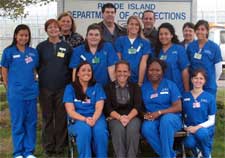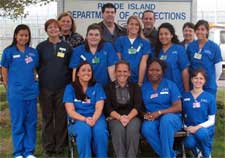 KINGSTON, R.I. – July 19, 2011 – For the last 25 years, Becky Carley has been providing primary health care as a volunteer at Crossroads Rhode Island, which provides help to the state’s homeless families, men and women.
KINGSTON, R.I. – July 19, 2011 – For the last 25 years, Becky Carley has been providing primary health care as a volunteer at Crossroads Rhode Island, which provides help to the state’s homeless families, men and women.
The nurse practitioner is also an assistant professor at the University of Rhode Island’s College of Nursing.
URI Associate Professsor of Nursing Ginette Ferszt volunteers at the state Department of Corrections and with the Rebecca Project for Human Rights to abolish shackling and restraining women inmates who go into labor. In between all of that, she teaches a full course load at URI and is the director of the Graduate Psychiatric Mental Health Nursing Program.
Diane C. Martins, URI associate professor of nursing, has provided care to the homeless and inmates. Martins is also volunteering with a planning group made up of the URI Feinstein Hunger Center, state Department of Human Services, and the Rhode Island Coalition for the Homeless to make policy changes in the state’s food stamp program.
These vignettes are just a small sample of how nursing faculty at URI work outside the boundaries of their classrooms to make Rhode Island, other states and countries healthier, more compassionate and more productive communities.
For 20 years, Associate Professor Alicia Curtin, has been volunteering in the Dominican Republic to provide health care, and now URI is working there to set up a partnership with the University of Santo Domingo. Each year, a group of nursing faculty led by Clinical Associate Professor Mary Lavin volunteers at the Marist Camp in New Hampshire for needy children. And another group does clinic work at St. Patrick’s Soup Kitchen in Providence.
“Volunteer community service and outreach are critical components of the College of Nursing that largely go unnoticed,” said Nursing Dean Dayle Joseph. “Not only are our faculty busy teaching in the classroom and in the clinical setting, they are keeping abreast of new developments in the field and keeping their licenses active by continuing to practice and taking continuing education courses. Add volunteering to these already busy schedules and you have people who are deeply committed to the work of healing and providing care to Rhode Island residents and beyond.”
Even Joseph herself, dean of the only nursing program in the state that offers programs at the bachelor’s, master’s and doctoral degree levels, volunteers as the secretary to the board of directors at the Rhode Island Free Clinic. She has also volunteered countless hours to address nursing workforce issues in the state.
Carley, who earned her bachelor’s degree in nursing from URI and her master’s from Boston University, teaches graduate students in URI’s nurse practitioner program and she is a primary care provider at the Crossroad Clinic, which is located at Crossroads Rhode Island in Providence.
“I started in 1986 working on the van that used to visit all of the shelters,” Carley said. “Then 14 years ago, I started a center for women’s health at which we focused on primary care. The work is all volunteer and now we see men and women.”
To maintain her nurse-practitioner certification and to supervise graduate students, Carley must provide direct patient care on a continuing basis. She could do that in a paid position and in fact did that until her third child was born. As a nurse practitioner, Carley performs exams, writes prescriptions and monitors her patients’ health on a regular basis.
“I really love this, and I love the patients,” Carley said. “In this economy, many people are on the verge of homelessness. So those old notions of the homeless as being alcoholics and drug addicts don’t hold true anymore. She said that’s only about 30 percent of the homeless population now. I get as much out of it as I give. For some reason, I have been blessed to not be homeless, and I have health care, a great job and family.”
She says as she works with homeless individuals she envisions people’s mothers, fathers, sisters and brothers.
“Everybody deserves health care, no matter what their status is. It is a right,” Carley said. “I see small miracles every time I am there. We see people with tremendous health problems, chronic dental problems, psychological problems and yet they persevere.”
In her role at URI, Carley serves as a preceptor offering individual mentoring to graduate students.
“I only take students who have the heart to work with this needy population, but most of our students do have that desire,” she said. “The students love these experiences because they are cross-cultural,” Carley said. “As a faculty member, I can guide them when they are facing a culture with different customs or ideas about health care. In addition, the students see a wide range of acute and chronic illness and injuries, which is great preparation for whatever path they choose when they finish their degrees.”
Professor Martins, who works with the planning group addressing homeless issues, said she uses the World Health Organization’s definition of health care to guide her approach to providing primary care.
“My philosophy of nursing is one that compels me to address social factors, the effects of class and poverty and health care disparity in the lives of patients,” Martins said. “If you have food to eat, a home to live in, those are all indicators of better health. My work with the homeless and women inmates addresses my passion and a critical need.”
When she worked in a New York City intensive care unit, she would become frustrated when seeing patients who she’d care for back on the streets.
She also observed the effects of social class on the nurses in the unit.
“We had a gentleman in the ICU (intensive care unit), a John Doe, who came in with hypothermia. The other nurses said, “Diane, oh he is one of yours.’ After several weeks, police came into the unit with two women and a man, who identified him as a family member and a university professor. Now, all of a sudden, the other nurses wanted him as patient. There should never be desirable or undesirable patients. It should be that we give everything we can to the patients we are treating, so I had to work in these areas.”
Martins, who has master’s degrees from Columbia University and the University of Connecticut, and her doctorate in nursing from UConn, said she has always been providing care to the homeless, but two years ago Professor Ferszt got her involved with the women’s prison. For 12 years, Ferszt has been counseling women who are depressed, helping them prepare for discharge and with helping them reunite with their children.
“Students love it. My undergraduate students come out of it saying it was the best experience of the nursing program at URI,” Martins said.
Pictured above
URI nursing professors and students gather outside with state Department of Corrections officials during a break from their clinical work. Photo courtesy state Department of Corrections.

